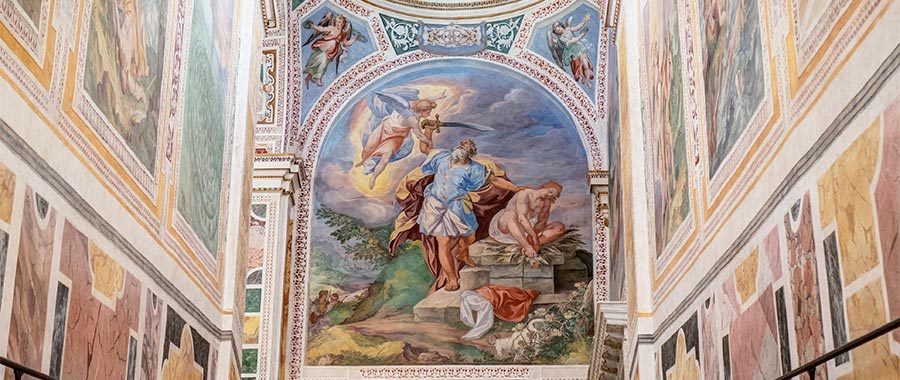Abraham, a pivotal figure in the religious history of humankind, is often referred to as the progenitor of monotheism in the West, a characterization that underscores his significance across multiple faith traditions. The recognition of his role transcends mere theology; it penetrates the spheres of philosophy, ethics, and social cohesion, thus illustrating the multifaceted nature of his influence. The profundity of his existence compels admiration and inquiry, not solely in religious contexts but also in the broader discourse of cultural heritage and interfaith dialogue.
A common observation regarding Abraham’s narrative centers on his extraordinary ability to forge a singular path to the divine, a path that diverged sharply from the polytheistic practices prevalent in his time. This has catalyzed profound fascination, inviting both scholarly analysis and spiritual reflection. His introduction of a monotheistic paradigm not only shifted the metaphysical underpinnings of his contemporaries but also laid a foundational framework for ensuing monotheistic religions, including Judaism, Christianity, and Islam. This triadic legacy begs the question: Why does Abraham remain so compelling in contemporary discourse?
At the heart of Abraham’s story is the archetype of the covenant, an intimate agreement established between the divine and humankind. This concept of a personal relationship with God serves as a crucial differentiator from the numerous gods worshiped within polytheistic traditions. The covenant signifies mutual commitment, a bond that elevates the divine-human relationship to unprecedented levels of significance. This aspect is particularly tantalizing for scholars and theologians alike, as it introduces topics of loyalty, faith, and the inherent human longing for connection, which resonate through the ages.
The narrative of Abraham is not merely an account of religious foundations but also serves as a metaphorical lens through which one can explore broader themes of identity, sacrifice, and moral integrity. Abraham’s willingness to sacrifice his son Isaac is emblematic of the complexities surrounding faith and obedience, presenting a dilemma that echoes through philosophical discourse. This particular episode invites the exploration of ethical absolutism versus relativism, raising questions regarding the nature of divine command and human autonomy. Such inquiries foster a rich dialogue around the responsibilities that accompany spiritual devotion.
Moreover, Abraham embodies the ideal of spiritual leadership, which is indispensable for understanding the evolution of monotheistic thought. His exemplary attributes—faith, obedience, and resilience—serve not merely as personal qualities but as imperatives for collective aspiration. The Abrahamic model of leadership is particularly relevant in contemporary society, where ethical frameworks are frequently challenged by moral relativism and cultural pluralism. This raises an intriguing point of convergence between ancient wisdom and modern ethical imperatives, thus underscoring Abraham’s relevance in a secularized world.
The implications of Abraham’s story extend into sociopolitical contexts as well. His position as a unifying figure across multiple faiths invites dialogue between Judaism, Christianity, and Islam. The shared respect for Abraham as a patriarch fosters a sense of kinship among these traditions, revealing the potential for interfaith collaboration and understanding. This interconnectedness challenges the frequently adversarial relationships that can arise between different religious communities. Thus, the examination of Abraham’s legacy becomes a conduit for exploring possible alignments within a pluralistic society.
Furthermore, the quasi-mythic status attributed to Abraham arises from the myriad interpretations and adaptations of his narrative throughout history. Different cultures have imbued the figure with various meanings, often aligning him with local customs and beliefs, thereby enriching the global tapestry of Abrahamic traditions. This adaptive quality of Abraham’s legacy alludes to a fundamental human tendency to seek relevance within spiritual paradigms, suggesting that the allure of Abraham transcends cultural boundaries and temporal limitations.
Additionally, the psychological dimensions of Abraham’s journey warrant exploration. The archetype of the hero’s journey, as delineated by Joseph Campbell, finds its essence in Abraham’s narrative arc. He embarks upon an adventure fraught with existential challenges and moral trials that resonate with the human condition. The exploration of doubt, faith, and ultimate redemption offers individuals a template through which they can navigate their spiritual quests, thereby reinforcing the timelessness of his story.
Ultimately, the scholarly fascination with Abraham as monotheism’s introducer is multifaceted, reflecting broader theological inquiries, ethical dilemmas, sociopolitical alignments, and psychological archetypes. His legacy continues to inspire rigorous discourse, encouraging the exploration of monotheism as a lived experience that shapes individual and collective identities. As such, Abraham stands as a beacon of spiritual introspection, moral courage, and interfaith dialogue.
In an era increasingly characterized by division and disconnection, the examination of Abraham’s monotheistic foundations offers a reminder of shared origins and collective aspirations. This shared legacy urges a reconsideration of common values, urging adherents of various faiths to seek understanding rather than dwell in discord. In this light, the profound reverence accorded to Abraham can serve not only as a testament to his historical significance but also as a rallying call for unity in a fragmented world.
